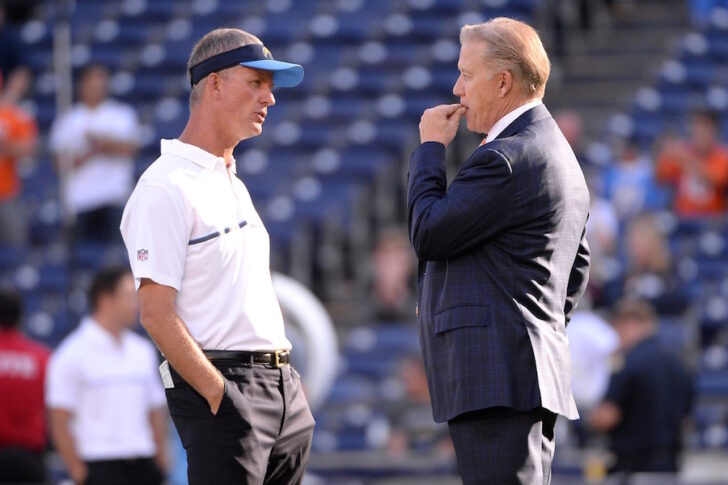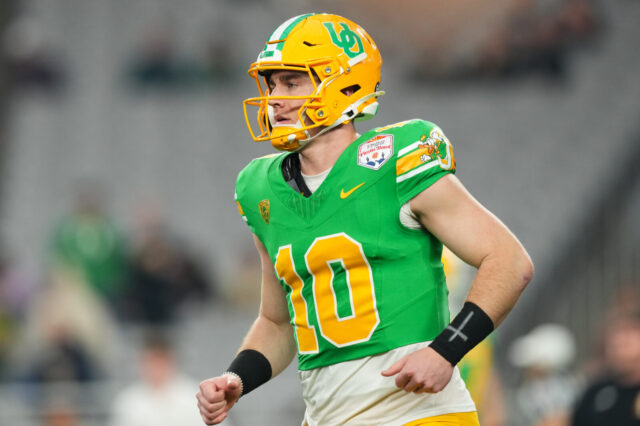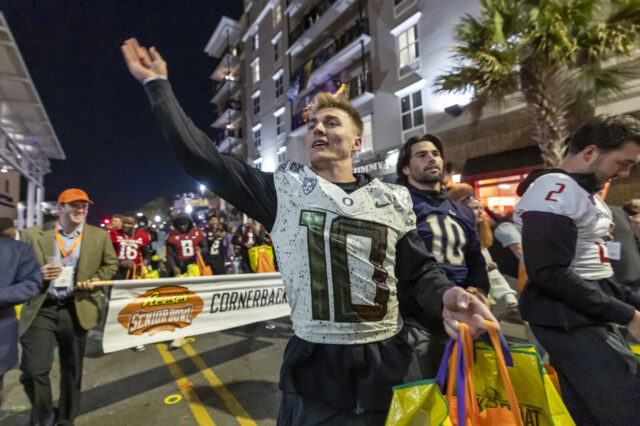Could the answer to the Denver Broncos offensive struggles be another blast from the past? No, Peyton Manning isn’t coming out of retirement. But one of his old coordinators in Denver very well could be available on Black Monday.
After leading the San Diego Chargers to a pair of 9-7 seasons following a successful stint as Denver’s offensive coordinator, Mike McCoy has stumbled to back-to-back losing seasons with a listless franchise that doesn’t even know where it’s going to call home in the near future. A Week 16 loss to the previously winless Browns may have served as the tipping point for McCoy’s time in San Diego. At least two observers think a reunion with the old OC in Denver might be the recipe for fixing a busted offense that was a big reason the Broncos snapped a string of five consecutive AFC West titles this year.
If Mike McCoy gets fired in SD, he'd be a good OC candidate in DEN. Showed great adaptability in Tebow year ('11). Good with Lynch. #Broncos
— James Merilatt (@jamesmerilatt) December 26, 2016
Their is no way Mike McCoy survives this season, the loss to Cleveland iast week was the last nail in the Coffin. @NextOCoordinator4Broncol
— Gil Whiteley, Now and Then (@Gilfest) December 27, 2016
James Merilatt and Gil Whiteley have followed and covered the Broncos through six head coaches, dating all the way back to Dan Reeves. So, they’ve seen their fair share of offensive coordinators come through the doors. Merilatt and Whiteley suggest that McCoy would be a logical choice to replace offensive coordinator Rick Dennison, whose job may be in jeopardy at the end of the season.
Denver missed the postseason this year for the first time since John Elway took over as VP of football operations and general manager, due largely in part to Denver’s offensive ineptitude. During a three-game losing streak from Weeks 14 to 16, the last which eliminated Denver from the playoffs, the Broncos scored just two offensive touchdowns – one of which was set up by a defensive turnover. Heading into Week 17, the Broncos are among the worst in the league in three-and-outs, red zone opportunities and first downs.
A report on Monday following a 33-10 loss at Kansas City suggested changes will be coming to the coaching staff and the personnel department at season’s end. While the Broncos have a history of promoting from within (see Adam Gase, who now leads the playoff-bound Dolphins), it’s unlikely that the current offensive staff will survive this offseason, if the reports are correct.
Denver does, however, have a fondness for keeping things familiar. Look no further than Kubiak’s return in 2015. The Broncos’ current head coach coordinated the offense in 1997 and ’98 that delivered Denver’s first Super Bowls. But that same offense sputtered in 2015, despite having a Hall of Fame quarterback at the helm and all but stalled out in 2016 under Trevor Siemian and Paxton Lynch. Even with Brock Osweiler at the helm for a spell in 2015 it wasn’t much better.
As the Broncos have experienced a seismic shift from their world-class quarterback and record-setting offense of 2013, they’ve been forced to adjust to lower-tier and changing talent at the position. Over his four years at the helm of the Denver offense, that was Mike McCoy’s calling card.
McCoy joined the Denver staff from Carolina in 2009 as offensive coordinator and quarterbacks coach under first-time head coach Josh McDaniels. While the McDaniels experiment proved to be a total failure in Denver, McCoy survived the transition to John Fox (his old head coach in Carolina) and navigated one of the muddiest times in Denver’s QB history.
Denver shipped Jay Cutler to Chicago for Kyle Orton before McCoy’s first year. Orton was the classic “game manager” – a far cry from the gun-slinging quarterback play Denver fans were used to seeing in guys like Cutler, Jake Plummer and Elway. Still, McCoy and McDaniels engineered an offense that ranked 15th in the league with Orton at the helm.
Entering the 2010 season, McCoy’s duties were shifted exclusively to coordinator duties, where he inherited his greatest professional challenge when McDaniels drafted Tim Tebow in the first round. Neither McDaniels nor Orton would last the season, still McCoy somehow managed to extract the No. 13 offense in the NFL out of the combination of Orton and a very raw, unprepared Tebow.
The environment McCoy would inherit in 2017 would not be too dissimilar to that one, should he find his way back to Denver. Trevor Siemian has played a few excellent quarters (Indianapolis, Cincinnati, New Orleans), but his overall performance has been very Orton-like over the full course of the season. Paxton Lynch, meanwhile, has shown outstanding athleticism in his limited time on the field, but accuracy and decision-making have been major question marks early.
Lynch clearly has better fundamentals than Tebow (and none of the social distractions), but he doesn’t carry that “big moment” experience that proved so valuable late in games when McCoy and Tebow always managed to draw up just enough correct plays to snatch victory from the jaws of defeat.
Then, in his final year leading the offense, McCoy’s offense exploded under Peyton Manning. In 2012, Denver climbed to No. 4 overall and No. 2 in scoring. McCoy’s system, fused with Manning’s, remained mostly intact in the record-setting 2013 season when Gase took over for McCoy after he landed the head job in San Diego.
McCoy has learned over four years in San Diego how to keep an athletic quarterback alive despite a sub-par offensive line. That’ll be a big help in Denver, given the struggles with that unit over the last year, and especially if they move on to Paxton Lynch.
Whether the plan is to move on immediately to Lynch or give Siemian one more year, McCoy shouldn’t be fazed in the least – he’s already lived through a much worse situation with Orton and Tebow. And McCoy’s proven ability to adapt to the talent around him – something the current staff has failed to do – make him a very interesting possibility as offensive coordinator, if and when he becomes available.



